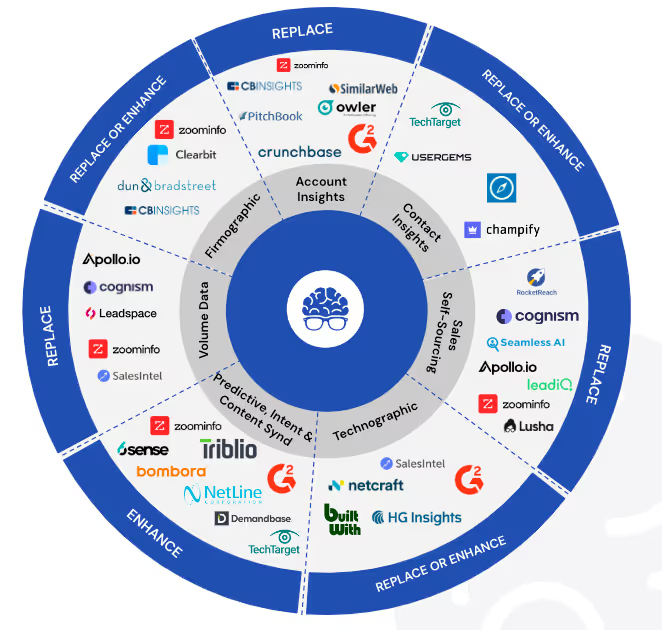In business, everyone is looking for a shortcut—a turnkey solution to instantly solve complex problems like segmentation, personalization, and prioritization. Tools like Keyplay and Ocean.io promise simplicity, but the reality is more nuanced. Growth and Go-To-Market (GTM) experimentation require something that no tool can deliver on its own: a thoughtful approach, a willingness to iterate, and above all, executive accountability.
People often want to pay for results, not the journey. But the journey—those so-called "failed" experiments—is where the real value lies. In many ways, failure is the key to unlocking success. When we fail fast, we learn fast. Each failure brings us closer to understanding what works and what doesn't, giving us the insights we need to grow.
The Problem with "Turnkey" Solutions
There’s an allure to the idea that you can buy a tool, hand it to your reps, and watch the revenue flow in. The truth is, no pre-built database or one-size-fits-all tool can fully understand the unique aspects of your business. Your product, market, and customer needs are more bespoke than that. It’s not just about plugging in a system; it’s about adapting, refining, and improving over time.
Buying a tool and hoping it solves everything is like buying a gym membership and expecting six-pack abs without showing up. It takes consistent effort, experimentation, and yes—some failures along the way.
Why GTM Experimentation Matters
You can’t unlock growth without experimentation, and experimentation is inherently messy. But messiness brings insights, and those insights help your team become smarter, more agile, and better equipped to tackle the next challenge. The key is to embrace that process instead of shying away from it.
- Segmentation: How do you know which accounts to prioritize? It’s not just about demographic data; it’s about trial and error, experimenting with different approaches, and refining your ICP (Ideal Customer Profile) over time.
- Personalization: Everyone talks about personalization, but it’s far more than plugging a first name into an email. Experimenting with messaging, timing, and approach is essential to finding what resonates with different segments of your audience.
- Prioritization: Not all leads are created equal. Finding out which ones deserve attention comes through iterative learning. No pre-formatted database can predict the perfect time to engage each account.
Why Executive Accountability Is Crucial
Without executive buy-in and accountability, experimentation won’t get the attention or resources it deserves. Leadership needs to champion this process, not just delegate it. It’s easy to get impatient and focus solely on short-term wins, but sustainable growth is the product of long-term commitment to testing, learning, and adapting.
Embrace Iteration Over Perfection
The quest for a quick fix often leads businesses astray. They jump from tool to tool, expecting each new system to solve their problems overnight. But your business isn’t static; it’s a living, breathing entity that evolves with your market and customers. Your solution should evolve with it.
That means you can’t afford to give up on experimentation just because the initial results are duds. In fact, those "duds" are often where the magic happens. They provide the data you need to make smarter decisions, to adapt your approach, and to eventually land on a strategy that works.
The Risk of Abandoning the Process Too Soon
One of the biggest risks for growth teams is pulling the plug too early. If you can’t run enough experiments in a short timeframe, you risk being thrown out with the bathwater. Time, not money, is often the real enemy, especially in fast-moving, VC-backed businesses. The temptation is to expect instant results, but growth is rarely a straight line.
And the worst part? When you throw away the process, you lose the potential insights that could fuel long-term growth. Don’t fall into the trap of thinking that a tool will save you. What will save you is persistence, experimentation, and a commitment to getting better over time.
GTM Experimentation: The Reality
The reality is that GTM experimentation isn’t just about running campaigns or trying new messaging. It’s about creating a culture of curiosity and resilience, where both failures and successes are celebrated as steps toward improvement. It’s about measuring what matters and iterating on what works.
It’s easy to sell snake oil—tools that promise perfect intent data or turnkey results—but the businesses that truly thrive are the ones willing to put in the work. They experiment, measure, and improve. They don’t look for shortcuts; they look for progress.
And here’s the truth: There’s no such thing as a turnkey solution for something as unique and dynamic as your business. Growth requires human insight, executive accountability, and a willingness to embrace the process of experimentation. It’s messy, but it works.
So, next time you’re tempted to seek a quick fix, remember: The real value lies in the experiments. Even the ones that don’t work.




